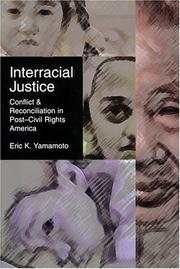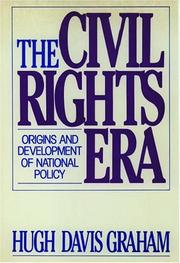| Listing 1 - 3 of 3 |
Sort by
|
Book
ISBN: 0674983947 9780674983946 0674416503 Year: 2018 Publisher: Cambridge (Mass.): Harvard university press,
Abstract | Keywords | Export | Availability | Bookmark
 Loading...
Loading...Choose an application
- Reference Manager
- EndNote
- RefWorks (Direct export to RefWorks)
The Civil Rights Revolution carries Bruce Ackerman’s sweeping reinterpretation of constitutional history into the era beginning with Brown v. Board of Education. From Rosa Parks’s courageous defiance, to Martin Luther King’s resounding cadences in “I Have a Dream,” to Lyndon Johnson’s leadership of Congress, to the Supreme Court’s decisions redefining the meaning of equality, the movement to end racial discrimination decisively changed our understanding of the Constitution. Ackerman anchors his discussion in the landmark statutes of the 1960s: the Civil Rights Act of 1964, the Voting Rights Act of 1965, and the Fair Housing Act of 1968. Challenging conventional legal analysis and arguing instead that constitutional politics won the day, he describes the complex interactions among branches of government—and also between government and the ordinary people who participated in the struggle. He showcases leaders such as Everett Dirksen, Hubert Humphrey, and Richard Nixon who insisted on real change, not just formal equality, for blacks and other minorities. The Civil Rights Revolution transformed the Constitution, but not through judicial activism or Article V amendments. The breakthrough was the passage of laws that ended the institutionalized humiliations of Jim Crow and ensured equal rights at work, in schools, and in the voting booth. This legislation gained congressional approval only because of the mobilized support of the American people—and their principles deserve a central place in the nation’s history. Ackerman’s arguments are especially important at a time when the Roberts Court is actively undermining major achievements of America’s Second Reconstruction.

ISBN: 0814745490 0814796966 Year: 1999 Publisher: New York New York University Press
Abstract | Keywords | Export | Availability | Bookmark
 Loading...
Loading...Choose an application
- Reference Manager
- EndNote
- RefWorks (Direct export to RefWorks)
The United States in the twenty-first century will be a nation of so-called minorities. Shifts in the composition of the American populace necessitate a radical change in the ways we as a nation think about race relations, identity, and racial justice. Once dominated by black-white relations, discussions of race are increasingly informed by an awareness of strife among nonwhite racial groups. While white influence remains important in nonwhite racial conflict, the time has come for acknowledgment of ways communities of color sometimes clash, and their struggles to heal the resulting wounds
Minorities -- Civil rights -- United States -- History -- 20th century. --- Minorities -- Legal status, laws, etc. -- United States. --- Reconciliation -- History -- 20th century. --- Social conflict -- United States -- History -- 20th century. --- United States -- Race relations. --- United States -- Social conditions -- 1980-.

ISBN: 0195045319 Year: 1990 Publisher: New York Oxford Oxford University Press
Abstract | Keywords | Export | Availability | Bookmark
 Loading...
Loading...Choose an application
- Reference Manager
- EndNote
- RefWorks (Direct export to RefWorks)
Civil rights --- United States --- History --- 20th century --- Affirmative action programs --- Government policy --- Politics and government --- 1945-1989 --- Civil rights - United States - History - 20th century. --- Affirmative action programs - Government policy - United States - History - 20th century. --- United States - Politics and government - 1945 --- -Affirmative action programs --- United States - Politics and government - 1945-
| Listing 1 - 3 of 3 |
Sort by
|

 Search
Search Feedback
Feedback About UniCat
About UniCat  Help
Help News
News